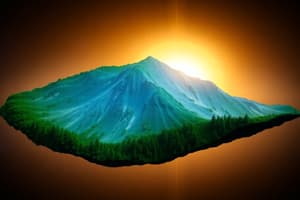Podcast
Questions and Answers
¿Cuál es el nombre del científico que colaboró con James Lovelock en la hipótesis de Gaia?
¿Cuál es el nombre del científico que colaboró con James Lovelock en la hipótesis de Gaia?
- Stephen Hawking
- Lynn Margulis (correct)
- Charles Darwin
- Albert Einstein
¿Cuál es el nombre del campo de estudio que se enfoca en la comprensión de la Tierra como un sistema acoplado de componentes vivos y no vivos?
¿Cuál es el nombre del campo de estudio que se enfoca en la comprensión de la Tierra como un sistema acoplado de componentes vivos y no vivos?
- Ecología
- Ciencia ambiental
- Ciencia del sistema terrestre (correct)
- Biología
¿Qué concepto se ha desarrollado a partir de la hipótesis de Gaia?
¿Qué concepto se ha desarrollado a partir de la hipótesis de Gaia?
- Ecología
- Hologenoma (correct)
- Ciencia del sistema terrestre
- Biodiversidad
¿Cuál es el objetivo principal de la hipótesis de Gaia?
¿Cuál es el objetivo principal de la hipótesis de Gaia?
¿Qué campo de estudio se ha visto influenciado por la hipótesis de Gaia?
¿Qué campo de estudio se ha visto influenciado por la hipótesis de Gaia?
¿Cuál es la crítica principal a la hipótesis de Gaia?
¿Cuál es la crítica principal a la hipótesis de Gaia?
¿Cuál es el nombre del científico británico que propuso la hipótesis de Gaia en 1972?
¿Cuál es el nombre del científico británico que propuso la hipótesis de Gaia en 1972?
¿Cuál es el término que describe la capacidad de la Tierra para regular sus condiciones ambientales?
¿Cuál es el término que describe la capacidad de la Tierra para regular sus condiciones ambientales?
¿Qué es el 'canto de la vida' según la hipótesis de Gaia?
¿Qué es el 'canto de la vida' según la hipótesis de Gaia?
¿Qué es lo que integra el sistema de regulación de la Tierra según la hipótesis de Gaia?
¿Qué es lo que integra el sistema de regulación de la Tierra según la hipótesis de Gaia?
¿Quién es el microbiólogo que trabajó con James Lovelock en la hipótesis de Gaia?
¿Quién es el microbiólogo que trabajó con James Lovelock en la hipótesis de Gaia?
¿Cuál es el nombre del proceso que mantiene las condiciones necesarias para la vida en la Tierra?
¿Cuál es el nombre del proceso que mantiene las condiciones necesarias para la vida en la Tierra?
Flashcards are hidden until you start studying
Study Notes
The Gaia Hypothesis: Earth as a Self-Regulating System
The Gaia hypothesis, also known as the Gaia theory or Gaia principle, is a scientific theory that proposes the Earth's biosphere and its inorganic surroundings form a self-regulating system. This concept, which originated from the work of British scientist James Lovelock and microbiologist Lynn Margulis in the 1960s and 1970s, suggests that the Earth's atmosphere, hydrosphere, and lithosphere are regulated around "set points" as in homeostasis, with the biosphere acting as a self-organizing system that maintains the conditions necessary for life.
Earth as a Self-Regulating System
The Gaia hypothesis asserts that the Earth's biosphere is not merely a passive environment for life but an active participant in the planet's self-regulation. This is evident in the Earth's atmosphere, which contains reactive gases such as oxygen and methane, constantly renewed through biogeochemical processes. These gases have a disequilibrium that radiates an infrared signal, known as the "song of life," which is detectable even from outside the Solar System.
James Lovelock
James Lovelock, a pioneering British scientist, first introduced the Gaia hypothesis in 1972. He proposed that Earth can be understood as a vast self-regulating organism in which all living things collectively define and maintain the conditions conducive for life on Earth. Lovelock's work has been recognized with numerous awards and honors, including honorary degrees and memberships in prestigious scientific societies.
Lynn Margulis
Microbiologist Lynn Margulis collaborated with Lovelock in supporting the Gaia hypothesis. Her work emphasized the importance of understanding the Earth's atmosphere, hydrosphere, and lithosphere as interconnected systems, with the biosphere playing a crucial role in regulating these systems. Margulis's insights have been vindicated by the development of Earth system science, which considers the planet as a coupled system of living and non-living components.
Ecology and Environmental Science
The Gaia hypothesis has influenced the fields of ecology and environmental science by promoting the idea of Earth as a self-regulating system. This concept has led to a better understanding of the connections between different components of the Earth's biosphere and the importance of maintaining the delicate balance that supports life. It has also highlighted the role of biology in regulating the planet's climate and the consequences of human actions on this balance.
Criticisms and Debates
Despite its influential status, the Gaia hypothesis has faced criticisms and debates. Some argue that organisms cannot act in concert to regulate the environment, as it would require foresight and planning from them. Others argue that the Earth's biosphere is not a self-organizing system, but rather a collection of different ecosystems with varying levels of self-regulation.
Evolution and Adaptation
The Gaia hypothesis challenges traditional views of evolution by emphasizing the importance of environmental feedback in shaping life on Earth. According to this perspective, life evolves in response to environmental change, but the environment also evolves in response to biological change. This view has led to the concept of the hologenome, which suggests that the genetic wealth of the entire Earth system, including both living organisms and their environment, can acquire characteristics that are conducive to life.
Conclusion
The Gaia hypothesis, with its focus on Earth as a self-regulating system, has significantly influenced our understanding of the planet's biosphere and the importance of maintaining the delicate balance that supports life. While debates and criticisms continue, the core idea of the Gaia hypothesis remains a powerful framework for thinking about the Earth's complex systems and their interactions.
Studying That Suits You
Use AI to generate personalized quizzes and flashcards to suit your learning preferences.




